Published
- 14 min read
The Best Vultr Alternative: Top 10 Picks in 2025

Choosing a provider for your cloud infrastructure is one of the most critical decisions your business will make. The right partner impacts your product’s speed, your monthly operational costs, and the skills your team needs to manage your cloud computing environment effectively.
While Vultr offers a range of features, it’s essential to explore alternatives to ensure you find the perfect fit.
In this guide, we’ll break down:
- Key factors to consider when choosing a cloud service provider
- The top 10 Vultr alternatives in 2025 (with pros and cons)
- Why some teams are moving away from VPS-only providers
- How you can migrate workloads easily to better solutions
👉 If you’re also evaluating how cloud automation and AI-powered infrastructure are changing deployments, check out this article on automated software deployment for deeper insights.
Key Highlights
- Vultr is a popular cloud hosting provider, but several affordable cloud solutions offer better value in terms of features, support, and transparent pricing.
- Key factors to evaluate when choosing a Vultr alternative include performance, scalability, developer user experience, support services, and global reach.
- Providers like DigitalOcean, Linode, and Hetzner offer competitive pricing and robust cloud infrastructure for developers and small businesses.
- Hyperscalers like AWS Lightsail and Google Cloud Platform provide entry points to their ecosystems, though they can introduce pricing complexity.
- Kuberns emerges as a leading alternative, balancing high performance, dedicated resources, and cost-effective plans for growing businesses.
- Making the right choice depends on your specific needs, whether it’s managed services, bare metal servers, or a simple, predictable billing model.
Factors to Consider When Choosing a Cloud Services Provider
 When comparing Vultr competitors or searching for the best Vultr alternatives, it’s not just about finding the cheapest VPS.
When comparing Vultr competitors or searching for the best Vultr alternatives, it’s not just about finding the cheapest VPS.
The right cloud services provider should match both your current needs and your long-term growth plans.
Here are some important factors to consider:
Pricing and Transparency
Cloud pricing is often more complicated than it seems. Providers may offer attractive entry-level plans, but costs can rise sharply with bandwidth, storage, or additional services. A recent Gartner report highlighted that up to 30% of cloud spend is wasted due to poor provisioning and hidden charges. Choosing a provider with clear pay-as-you-go pricing can help avoid surprises.
Performance and Scalability
A hosting solution that works for a side project might not handle a scaling SaaS product. Evaluate whether the provider offers reliable uptime SLAs, high-performance compute, and the ability to scale resources without migration headaches. This is where many startups outgrow VPS-only providers like Vultr and look toward AWS-grade infrastructure or equivalent.
According to users on Reddit, popular cloud server providers recommended as alternatives to Vultr in 2025 include Kuberns, DigitalOcean, Linode, Hetzner, and OVH, which are frequently praised for their reliable support and active developer communities.
Developer Experience
Modern teams value automation and deployment simplicity. Cloud hosting providers that integrate with Git workflows, CI/CD pipelines, and monitoring tools can significantly reduce operational overhead. If you’re curious about how automation is reshaping deployments, here’s a helpful deep dive into CI/CD tools for developers in 2025.
Support and Ecosystem
Support often gets overlooked until something breaks. Some Vultr alternatives, like enterprise clouds, provide robust ecosystems with documentation, managed databases, and global availability zones. Others focus on lean pricing but offer limited add-ons or integrations.
Compliance and Data Sovereignty
For businesses in regulated industries or specific regions, compliance and data sovereignty are critical. European cloud providers like OVHcloud or Scaleway emphasise this, making them strong choices for EU-based teams.
Ultimately, choosing a Vultr alternative is about balancing cost, performance, and simplicity with the flexibility to grow.
Top 10 Vultr Alternatives in 2025
As the cloud ecosystem evolves, developers and businesses are seeking more than just affordable VPS hosting. In 2025, the best Vultr alternatives combine scalability, automation, transparent pricing, and global reach.
Below is a deeper look into ten standout options, including why each could be the right fit depending on your needs.
Kuberns
 Kuberns offers AWS-grade cloud infrastructure at up to 40% lower cost. Unlike Vultr, which relies on VPS models, Kuberns leverages aggregated AWS capacity and AI to automate deployments, scaling, and monitoring. This gives teams enterprise-grade reliability without the AWS bill shock.
Kuberns offers AWS-grade cloud infrastructure at up to 40% lower cost. Unlike Vultr, which relies on VPS models, Kuberns leverages aggregated AWS capacity and AI to automate deployments, scaling, and monitoring. This gives teams enterprise-grade reliability without the AWS bill shock.
It’s an intelligent alternative for teams that want automated CI/CD workflows, unified observability, and real-time autoscaling, without the usual overhead. This isn’t bare-metal hosting, but it delivers enterprise-grade performance through developer-friendly automation.
Best for: Startups, agencies, SaaS businesses, and freelancers who want scalability, predictable costs, and a simple path to growth.
Pros:
- Backed by AWS global infrastructure and availability zones
- Transparent, flat pay-as-you-go pricing (no platform fees, no lock-ins)
- Full-stack support: backend, frontend, APIs, databases, and monitoring
- AI-powered deployment with no DevOps overhead
If you want to understand how kuberns cuts AWS cost by 40%, this guide explains how teams can move beyond VPS hosting.
DigitalOcean
 DigitalOcean is one of the most popular VPS hosting providers and is often compared directly with Vultr. It’s known for its simplicity, beginner-friendly interface, and flat-rate pricing that appeals to solo developers and small startups.
DigitalOcean is one of the most popular VPS hosting providers and is often compared directly with Vultr. It’s known for its simplicity, beginner-friendly interface, and flat-rate pricing that appeals to solo developers and small startups.
Best for: Developers building small to mid-sized apps, hobby projects, or startups looking for simple cloud hosting.
Pros:
- Straightforward pricing starting as low as $5/month
- Droplets (VMs) are easy to launch and manage
- Strong tutorials and community documentation
- Managed services for databases and Kubernetes
Cons:
- Gets expensive as workloads scale beyond entry-level plans
- Not as robust for enterprise-scale workloads compared to AWS/GCP
Linode (Akamai Cloud)
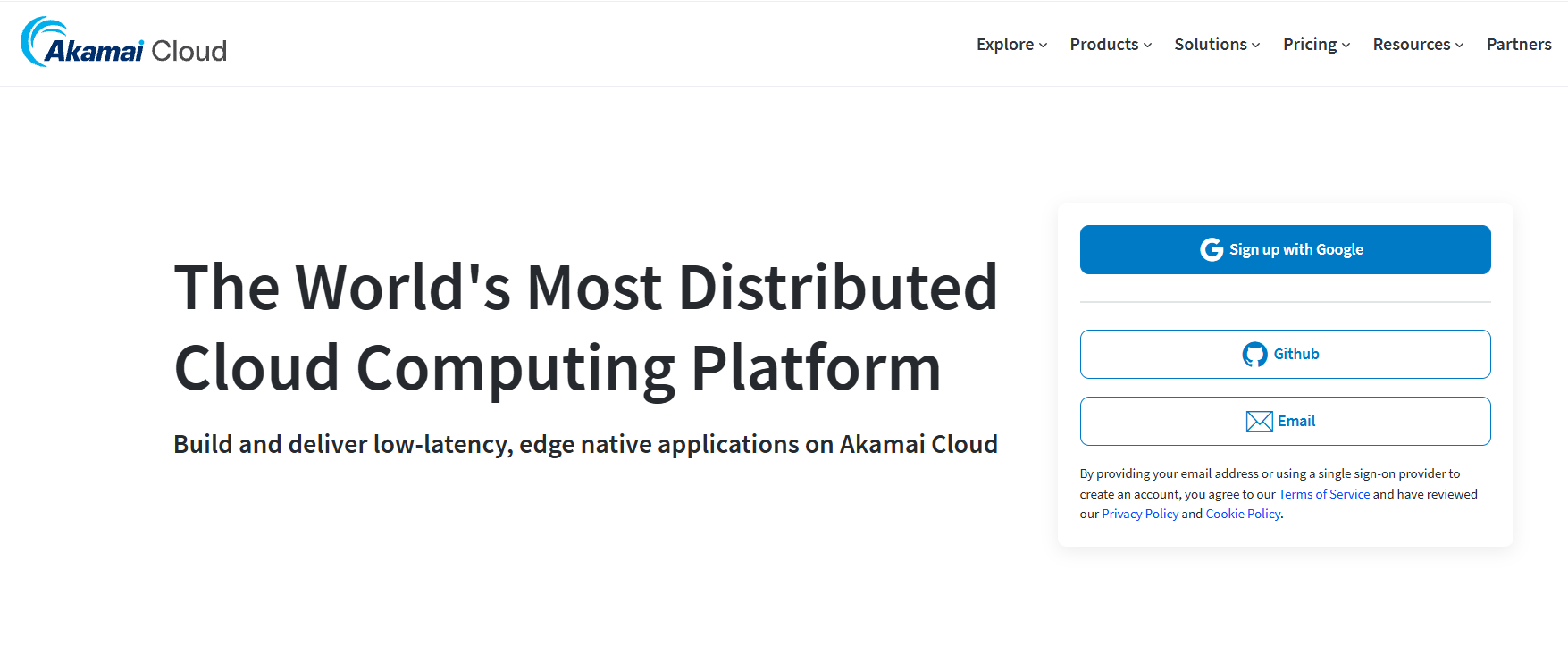 Linode, now under Akamai, has been a long-standing Vultr competitor in the VPS space. It’s known for budget-friendly hosting with solid performance and developer-first features.
Linode, now under Akamai, has been a long-standing Vultr competitor in the VPS space. It’s known for budget-friendly hosting with solid performance and developer-first features.
Best for: Cost-conscious teams and developers who want reliable VPS hosting with predictable costs.
Pros:
- Pricing starts at around $5/month
- Developer-friendly features like APIs and CLI tools
- Good support reputation
- Recently expanded with Akamai’s global CDN edge network
Cons:
- Smaller cloud ecosystem compared to hyperscalers
- Limited advanced automation or AI-driven scaling
Hetzner
 Hetzner is a German hosting provider popular for offering some of the cheapest bare-metal servers and cloud instances in Europe. It’s a top choice for developers who want raw performance at low cost.
Hetzner is a German hosting provider popular for offering some of the cheapest bare-metal servers and cloud instances in Europe. It’s a top choice for developers who want raw performance at low cost.
Best for: High-performance applications, gaming servers, or developers who prefer managing infrastructure directly.
Pros:
- Very low pricing compared to Vultr or DigitalOcean
- Dedicated servers at competitive rates
- Reliable EU data centres
Cons:
- Limited global presence (primarily Europe)
- Requires manual server management, no automation
UpCloud
 UpCloud positions itself as a premium VPS hosting provider, emphasising performance and uptime. Its MaxIOPS storage is marketed as faster than typical SSD storage, making it a favourite for speed-critical workloads.
UpCloud positions itself as a premium VPS hosting provider, emphasising performance and uptime. Its MaxIOPS storage is marketed as faster than typical SSD storage, making it a favourite for speed-critical workloads.
Best for: Businesses that value uptime and speed over budget pricing.
Pros:
- Excellent performance benchmarks
- Strong SLA guarantees (100% uptime in some cases)
- Good customer support reputation
Cons:
- Pricing is higher than budget providers like Vultr or Hetzner
- Smaller ecosystem and fewer global data centres
AWS Lightsail
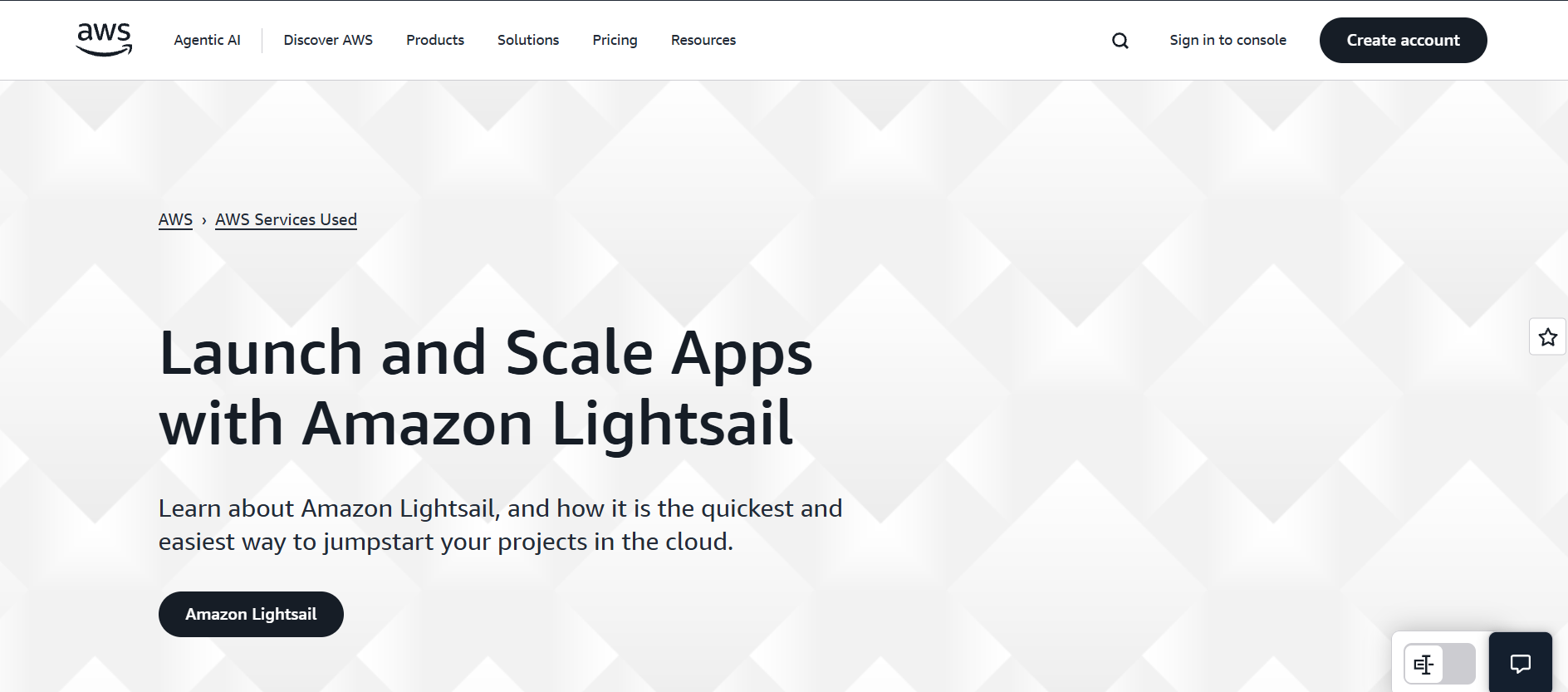 AWS Lightsail is Amazon’s simplified VPS product designed for developers who want AWS reliability without diving into the full complexity of AWS services. It’s often compared as a midpoint between Vultr and AWS EC2.
AWS Lightsail is Amazon’s simplified VPS product designed for developers who want AWS reliability without diving into the full complexity of AWS services. It’s often compared as a midpoint between Vultr and AWS EC2.
Best for: Teams that want to experiment with AWS while keeping costs predictable.
Pros:
- Backed by AWS global infrastructure
- Simple monthly pricing bundles
- Easy to scale into the full AWS ecosystem
Cons:
- More expensive than Vultr at entry-level tiers
- Limited compared to AWS EC2 or managed services
Kamatera
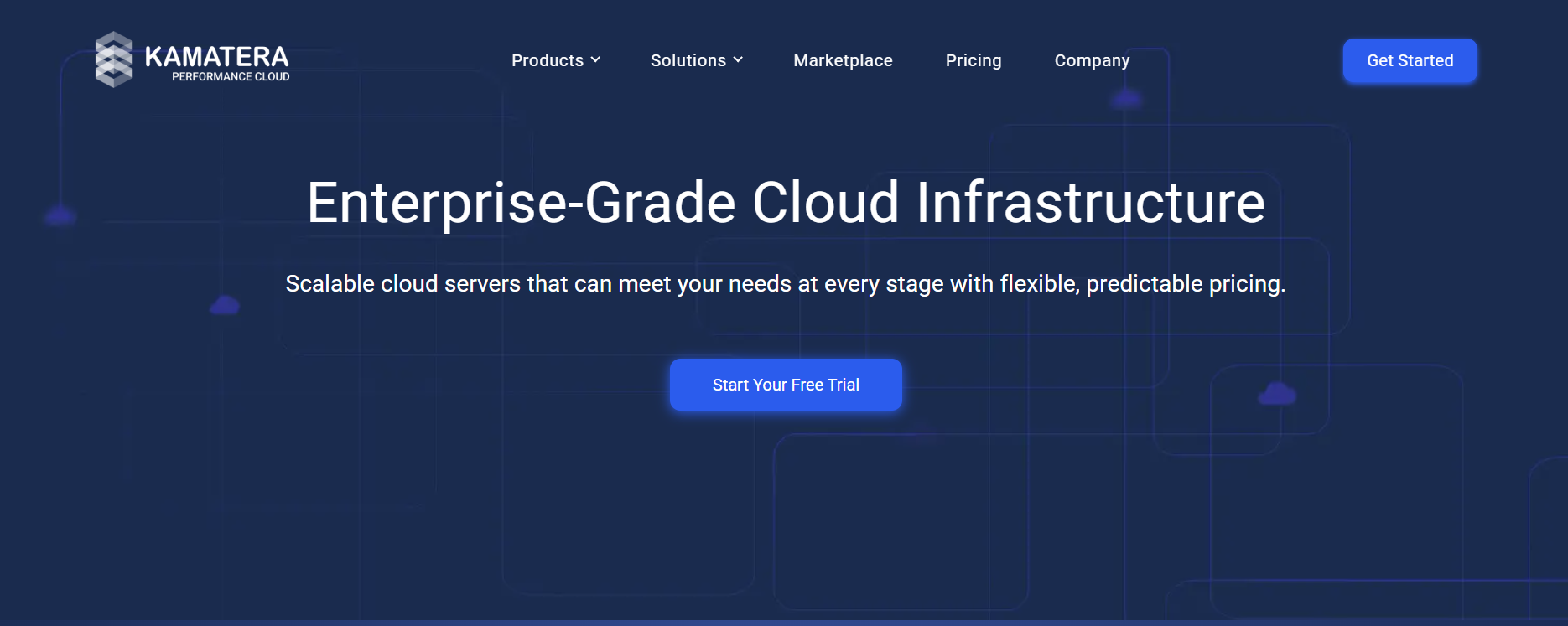 Kamatera offers highly customizable cloud hosting with instant scaling and granular configuration options. Unlike Vultr’s simplified VPS plans, Kamatera gives you full control over compute, RAM, and storage.
Kamatera offers highly customizable cloud hosting with instant scaling and granular configuration options. Unlike Vultr’s simplified VPS plans, Kamatera gives you full control over compute, RAM, and storage.
Best for: Developers and businesses needing granular control over infrastructure.
Pros:
- Flexible VM configurations
- Wide global data centre presence
- 30-day free trial
Cons:
- Pricing can be confusing with many variables
- Overwhelming for beginners
Google Cloud Platform (GCP)
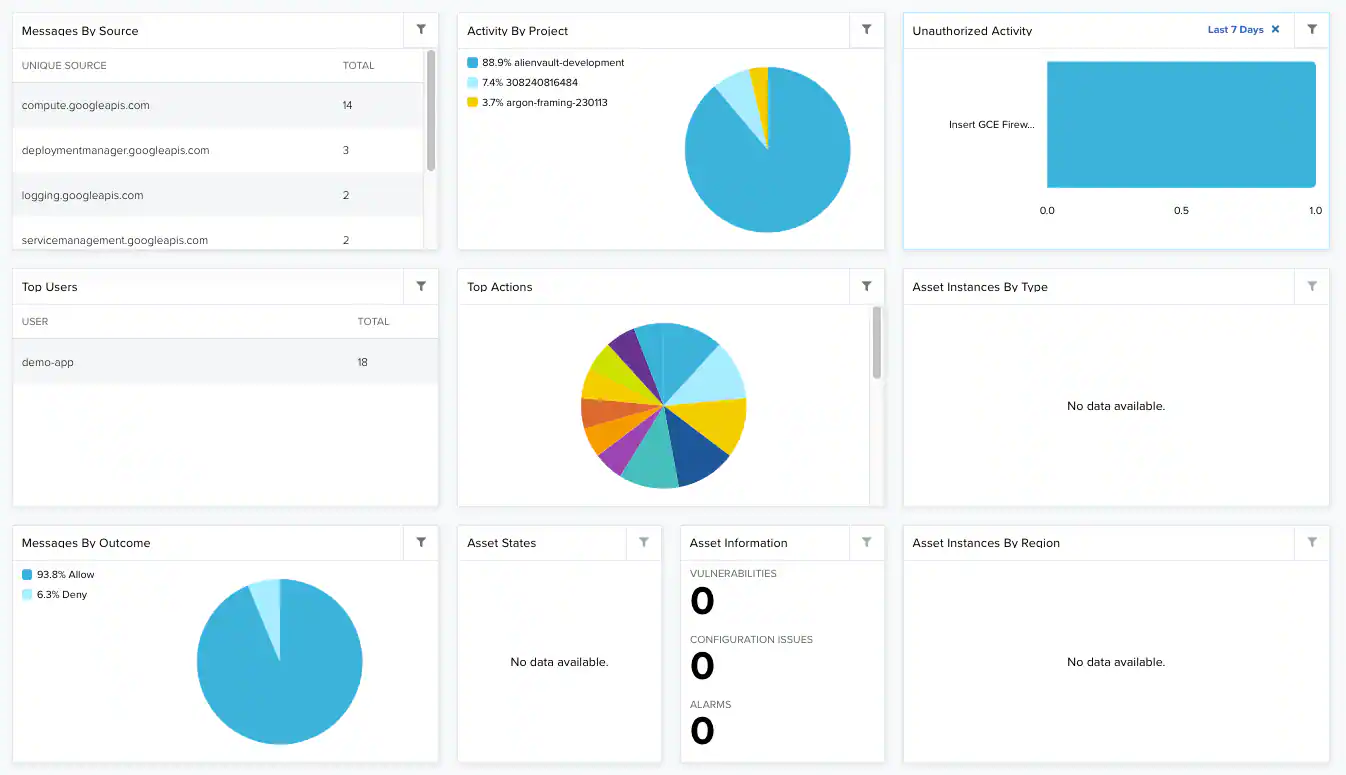 GCP is one of the top hyperscalers, providing advanced cloud infrastructure and managed services. Unlike Vultr, GCP is built for enterprises and data-heavy applications.
GCP is one of the top hyperscalers, providing advanced cloud infrastructure and managed services. Unlike Vultr, GCP is built for enterprises and data-heavy applications.
Best for: Enterprise apps, big data, and AI/ML workloads.
Pros:
- Advanced AI/ML and big data tools
- Global presence
- Rich ecosystem of managed services
Cons:
- Expensive compared to VPS providers like Vultr
- Steep learning curve
OVHcloud
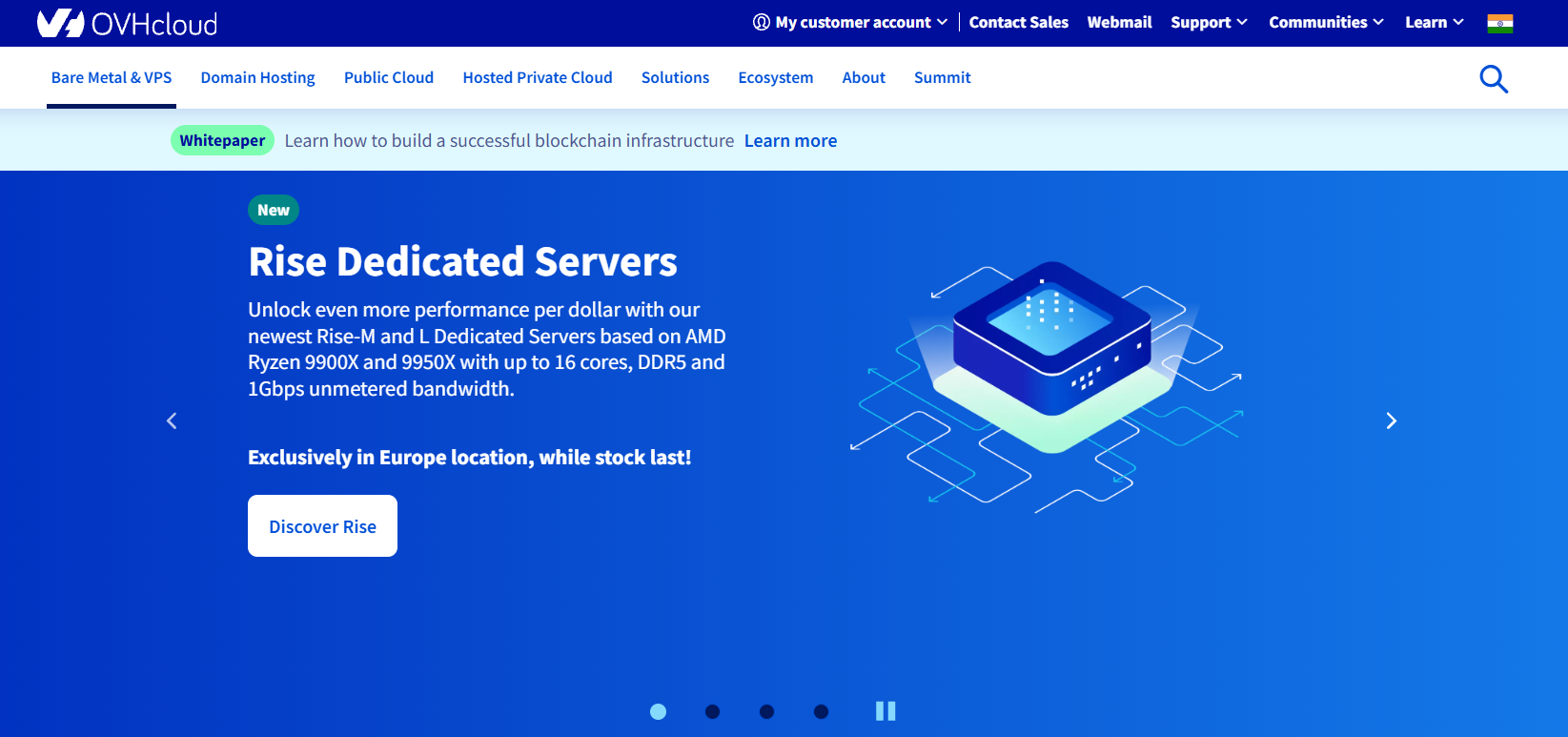 OVHcloud is a European cloud hosting provider known for affordable pricing and strong data compliance standards. It’s a leading Vultr alternative for businesses operating under GDPR regulations.
OVHcloud is a European cloud hosting provider known for affordable pricing and strong data compliance standards. It’s a leading Vultr alternative for businesses operating under GDPR regulations.
Best for: EU-based companies that need compliance and cost efficiency.
Pros:
- Affordable VPS and dedicated hosting
- Strong compliance and sovereignty focus
- Good European network reach
Cons:
- Limited integrations compared to AWS or GCP
- Mixed customer support reviews
Scaleway
 Scaleway is another European cloud provider with a developer-friendly approach. It focuses on sustainability and offers flexible compute options at competitive prices.
Scaleway is another European cloud provider with a developer-friendly approach. It focuses on sustainability and offers flexible compute options at competitive prices.
Best for: Indie projects, developer teams, and businesses prioritising sustainability.
Pros:
- Cost-effective cloud solutions
- Developer-focused APIs and tools
- Commitment to green hosting
Cons:
- Limited global availability
- Smaller ecosystem compared to hyperscalers
Pros and Cons of Vultr
Every cloud provider has its own set of pros and cons. Vultr is known for its wide global footprint and flexible billing for its virtual private servers. However, its product range and support options may not be as comprehensive as some of its competitors, leading many to seek alternatives.
Vultr: Strengths and Weaknesses
Understanding Vultr’s specific strengths and weaknesses provides a clear baseline for comparison. Vultr’s primary advantages lie in its extensive network of data centres and flexible billing options, which appeal to users needing a wide geographic reach and the ability to spin up servers for short periods. All its plans come with SSD storage for good performance.
However, some users have raised concerns about platform reliability and downtime, which can be a significant issue for production applications. Its product range is also more limited compared to competitors like DigitalOcean, particularly in its managed database offerings.
Furthermore, Vultr’s customer support is not available 24/7 and lacks the tiered, paid options that provide faster, more specialised assistance for urgent issues.
Here is a summary of Vultr’s strengths and weaknesses:
| Strengths | Weaknesses |
|---|---|
| 32 global data center locations | Limited customer support (not 24/7) |
| Flexible hourly and monthly billing | Reliability and downtime concerns raised by users |
| Offers dedicated and bare metal servers | Limited managed database offerings (no MongoDB) |
Takeaway: Vultr is a great choice for small workloads, testing environments, or cost-sensitive users. But for teams who want scalability, automation, and long-term cost savings, most look at Vultr alternatives like Kuberns, DigitalOcean, or Hetzner.
Kuberns: The Vultr Alternative Your Business Needs
For developers and businesses who love the simplicity of Vultr but need more scalability, automation, and predictable costs, Kuberns offers a compelling alternative. Instead of managing VPS servers manually, Kuberns runs your applications on AWS-grade infrastructure at up to 40% lower cost.
Unlike Vultr’s VPS-first approach, Kuberns is designed to help teams focus on shipping features rather than configuring infrastructure. With AI-powered deployments, built-in monitoring, and pay-as-you-go pricing, it eliminates many of the hidden costs and complexities that come with traditional cloud hosting.
| Feature | Vultr | Kuberns |
|---|---|---|
| Infrastructure | Proprietary VPS network with 30+ data centres | AWS global infrastructure (enterprise-grade) |
| Pricing | Starts at $2.50/month but add-ons and bandwidth overages can increase costs | Transparent pay-as-you-go pricing with up to 40% AWS cost savings |
| Scalability | Limited autoscaling; scaling often requires manual setup | Auto-scaling with AI-driven optimization |
| Deployment | Manual VPS setup; Kubernetes engine available but complex | AI-powered, no-YAML deployment directly from Git |
| Support | Basic support tiers | Developer-friendly onboarding + responsive support |
| Best For | Small projects, hobby apps, testing environments | Startups, SaaS teams, agencies, and growing businesses |
👉 If you’re curious about how teams streamline deployments, check out this guide on continuous deployment tools, which explains how modern platforms simplify scaling.
Migrate Your Workloads to Kuberns
With Kuberns, teams can reduce their AWS infrastructure spend by up to 40%, while gaining access to intelligent CI/CD pipelines, real-time observability, and a developer-first platform built for scale.
Whether you’re currently running on Vultr, DigitalOcean, Linode, or bare-metal, migrating is seamless and doesn’t require you to rebuild your systems from scratch.
Startups, agencies, and SaaS businesses are already making the switch to Kuberns to escape the limitations of VPS-based providers like Vultr. Instead of worrying about hidden costs or manual server configurations, you can deploy confidently knowing your apps are running on infrastructure trusted by enterprises, at a fraction of the cost.
There’s no DevOps team required, no infrastructure lock-in, and no hidden costs.
Experience what it’s like to have enterprise reliability at startup-friendly pricing and a migration process that ensures zero downtime.

Vultr Alternative FAQs
1. What is the best Vultr alternative in 2025?
A: The best Vultr alternative depends on your needs. For simple VPS hosting, providers like DigitalOcean, Linode, or Hetzner are strong choices. But if you want enterprise-grade reliability, automation, and lower costs, Kuberns stand out by delivering AWS infrastructure at 40% lower cost with built-in scaling and monitoring.
2. Is Vultr cheaper than AWS?
A: On paper, Vultr often looks cheaper than AWS because it offers low-cost VPS instances. However, when workloads scale, hidden costs like bandwidth, storage, and add-ons make the difference smaller. By contrast, solutions that optimise AWS capacity, like Kuberns, can actually be more affordable than Vultr while still giving you access to AWS’s global infrastructure.
3. Can I migrate from Vultr to another provider easily?
A: Yes, migration is possible and often easier than expected. Most Vultr alternatives, including Kuberns, provide staging environments, Git-based deployment, and zero-downtime migration. The process is designed to let you move workloads without interruptions.
5. How does Kuberns save 40% compared to AWS or Vultr?
A: Kuberns aggregates AWS compute resources and passes on bulk savings directly to users. Unlike Vultr’s VPS model, you only pay for the actual resources you use, with no platform fees or lock-ins. This results in up to 40% lower cloud bills while running on enterprise-grade AWS infrastructure.
6. Who should use Kuberns instead of Vultr?
A: Kuberns is ideal for startups, SaaS businesses, agencies, and developer teams who want to avoid the hidden costs and manual setups of VPS providers. It’s especially valuable if you need full-stack hosting, AI-powered deployments, and predictable pricing without the complexity of managing AWS directly.